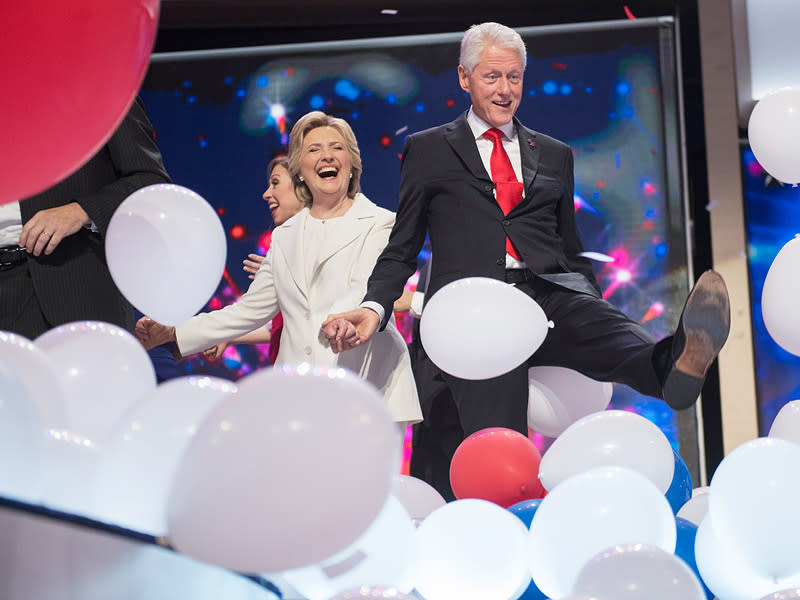New Book Goes Inside Bill Clinton's 'Complicated' Relationships with Donald Trump, Barack Obama – and Hillary

Author Joe Conason, a 20-year student of Bill Clinton, made headlines with his new biography of the former president even before the book hit the shelves. (Remember that leaked dinner-party scene where former Secretary of State Colin Powell allegedly advised then-current Secretary of State Hillary Clinton on her ill-fated private email server? It's complicated, right?)
Now that Conason's Man of the World: The Further Endeavors of Bill Clinton is in bookstores this week, we see that he tackles in 486 pages the even more complicated matters of Clinton's relationships with the biggest names in political headlines this season.
Here's the meat of it:
1. Donald Trump thought he was owed an invitation to Chelsea Clinton's wedding
The man now bitterly opposing Hillary Clinton for the presidency once angled to be included in her family's social circle, Conason writes. Trump donated to their political campaigns and charitable foundation, and "hosted a somewhat reluctant Bill and Hillary" at his third wedding in 2005. When it came time for the Clintons to throw their own wedding gala – for daughter Chelsea – Trump went looking for his invitation.
"Having given Bill Clinton free access to his northern Westchester golf club, Trump National, where he proudly hung photos of the former president – and had even cleared the links once for the Clintons to play on Bill's birthday – Trump may well have felt that there was simply no way he was not on the guest list," Conason writes.
Alas, none came and Trump resorted to calling top Clinton aide Doug Band. "I'm supposed to be at the wedding, Doug," Conason quotes Trump as saying in his fruitless appeal to Band. "But I didn't receive the invitation, and I need to know where to go."
2. The optics of Hillary and Bill campaigning together have been tricky for a while
Ever wonder why Bill and Hillary Clinton don't appear much together on the campaign trail? To be fair, neither do Donald and Melania Trump. But, in the Clintons' case, Conason sees a purposeful, strategic decision at work.
Recounting the couple's joint appearance on the altar at Coretta Scott King's February 2006 funeral, Conason describes Bill Clinton electrifying the audience with his speech and being rewarded with laughs and bursts of applause.
"Following him, Hillary delivered prepared remarks that, on paper, were touching and uplifting. But her reception didn't approach the wild clapping, laughter, cheers, tears and roars of 'Amen!' in response to his extemporaneous sermon. The reviews were unsparing: 'As Bill riffed, Hillary stood by his side, looking like the gawky sidekick in a teen movie ... He stole the show.'
"Such nagging comparisons could be minimized, if not eliminated, by making sure that husband and wife didn't appear together in public too often," Conason writes.
3. Bill Clinton came to 'dislike intensely' Barack Obama – at first
After then-Sen. Obama defeated Hillary Clinton in a bitterly fought 2008 primary race, Bill Clinton wanted Obama to personally ask for the former president's endorsement.
"After weeks of waiting, however, the message from Obama headquarters in Chicago was more insulting than encouraging. Evidently the prospective nominee was too busy to meet with the only Democratic president who had served two terms since FDR," Conason writes. Clinton instead got a 20-minute phone call and "thought their chat had been perfunctory and superficial. He was not impressed and not mollified."
Clinton nonetheless agreed to speak for Obama at the 2008 Democratic National Convention that would make his presidential nomination official. Among those who traveled with Clinton to convention was Jesse Dylan, the oldest of Bob Dylan's children and an ardent Obama supporter who directed the "Yes We Can" wildly viral music video (with 57 million views) featuring will.i.am and a dazzling array of celebrities supporting Obama.
Conason writes: "Dylan had pulled them all together and put up his own money to produce the video. He had expected nothing in return and nothing was what he got: Not a telephone call from the candidate, not a thank you note ... "
When Clinton heard how the Obama campaign treated Dylan, "the former president shook his head. To Clinton, who had prided himself all his life on remembering people and writing appreciative notes, such unfeeling behavior was worse than a sin; it was a mistake."
It was a few weeks after the convention, over a catered lunch of grilled chicken and vegetables in Clinton's offices in Harlem, that the chill between him and Obama began to thaw. "The mood was cordial. Clinton was delighted that Obama had finally showed up to repair their relationship," Conason writes.
Only after Clinton so forcefully campaigned for Obama in the weeks that followed, culminating in Obama's win on Election Day, did things between the two men grow downright chummy.
At one joint campaign rally in the late-October homestretch, "Clinton and Obama took the stage with their arms around each other's shoulders," Conason writes. "Obama took the microphone, gestured toward Clinton and said loudly: 'In case all of you forgot, this is what it's like to have a great president.' As he listened to those words, Clinton was touched, his face etched with emotion.'"

